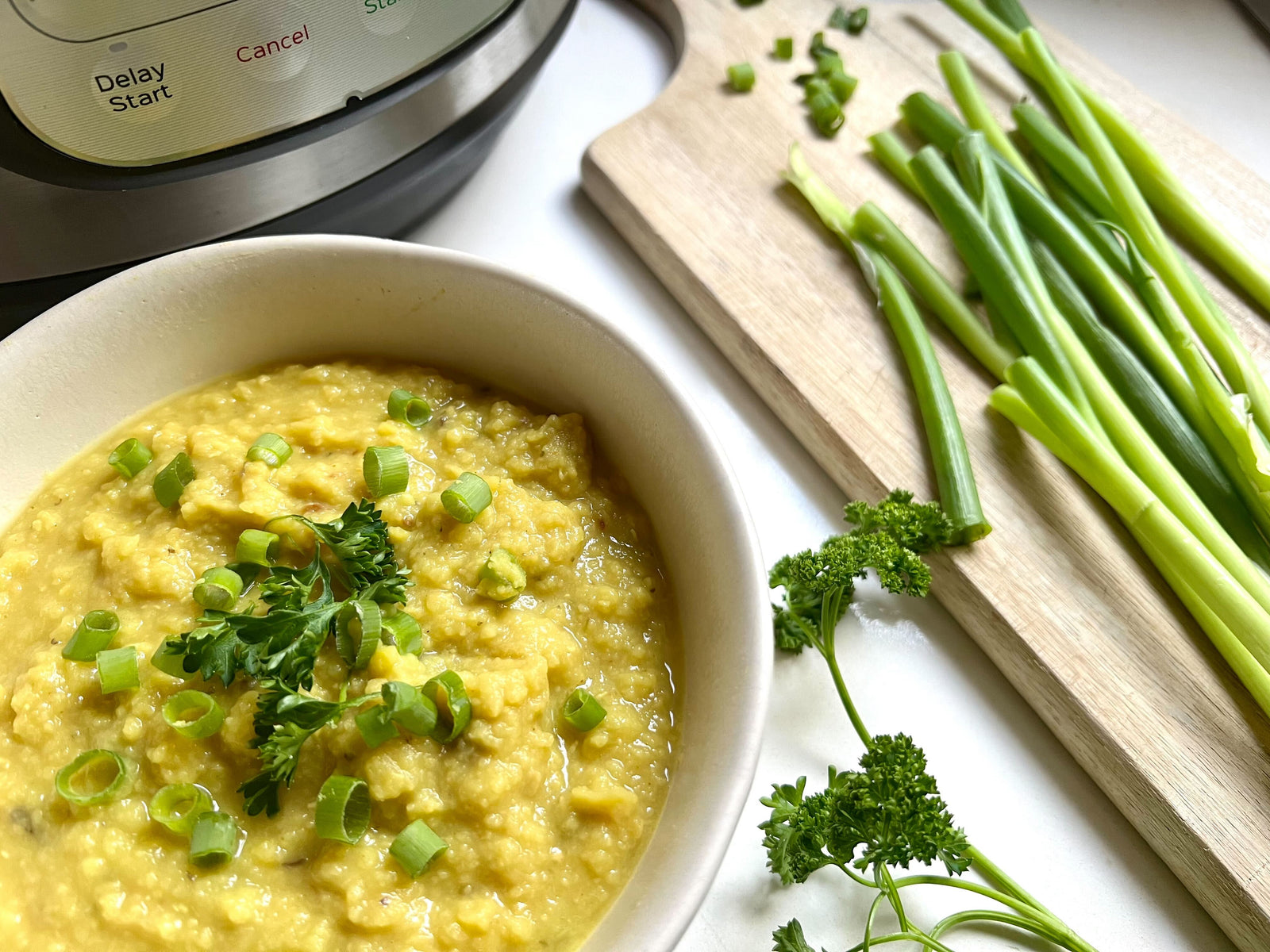Healthy Swaps For Your Favorite Comfort Foods

Eating our favorite foods can be comforting during stressful times and a New York Times article titled “Stress Baking More Than Usual?” reflects what grocery store owners are reporting - increased sales of baking supplies, beer, chocolate, and wine!
This is no surprise as difficult times can be a recipe for stress based eating that can result in over indulging in foods that may make us feel good in the moment, but ultimately undermine our health.
Fortunately, our bodies are infinitely wise and we crave what we need to maintain balance. Carbohydrate-rich foods can help ward off anxiety, boost your mood, and even protect cognitive function by helping your body produce serotonin, while healthy fats are critical to maintaining hormonal balance and cell health.
We just need to learn how to interpret and satisfy those cravings in a healthy way (in other words: no one’s body needs refined sugar, unhealthy fats, or excitotoxins, for example).
It is actually fairly easy to make comfort foods that are healthy. All you need to do is follow these 7 hacks!
Hack #1: Swap Processed Oils For Healthier Fats
We are big fans of fats around here. Not only does it make food taste good, but getting enough healthy fat is essential for brain development, weight-management, and healthy digestion.
One of the best ways to make your comfort foods healthier is to swap out your typical refined, vegetable and seed oils for organic, healthier, stable fats.
Read The Hard Truth About Refined Oils for a deep dive into this topic.
Unhealthy fats and oils to avoid:
- Canola (even organic canola)
- Cottonseed
- Grapeseed
- Rapeseed
- Sunflower
- Safflower
- Soybean
Healthy fats and oils to replace with:
- Avocado oil - great for frying, high-heat cooking, and baking). It has a mild flavor that many people prefer in some recipes.
- Butter or Ghee - choose organic, grass-fed if you can find it.
- Perilla Oil - great for sautéing. Perilla oil is used in medicinal cooking as an aid to help heal leaky gut as it blocks the entry of LPS (lipopolysaccharides) past the gut wall.
- Cold-Pressed Extra Virgin Olive Oil - look for small bottles as large ones will go rancid.
- Flaxseed oil - for salads
- Hemp oil - for salads
- Macadamia oil - for salads
- Palm Shortening - sourced from eco-friendly traditional farms
- Virgin coconut oil - great for sautéing, baking (you can freeze coconut oil to then grate into pastry recipes, for example), and everything in between
- Sesame oil - sautéing and for salads
- Walnut oil - delicious on salads
- Rice Bran Oil - sautéing and stir frying
- Whole nuts and seeds
Hack #2: Replace Refined Sugar With Alternatives
We all love food with a sweet taste, especially when the going gets tough… and there’s a reason for that!
When we experience stress the body prepares to “fight or flight” by flooding the bloodstream with glucose, which gives us the energy we need to face a threat, which is one reason we crave more sugar.
Our bodies need the sweet taste to maintain energy, nourish the spleen/pancreas and the liver which stores glycogen.
The key is to stick with natural sugars and those found in fruits and vegetables.
The following are our favorite refined-sugar-alternatives for baking, coffee, lemonade, etc:
- Coconut palm sugar - replace 1:1 for white sugar in any recipe.
- Maple syrup or maple sugar - when baking with maple syrup, reduce the amount of liquid in your recipe by one-third. Maple sugar can be used 1:1 in place of white sugar.
- Dates and date sugar - dates are rich in minerals and date paste can be used to make a variety of amazing sweet treats. Date paste can also be used to replace some fat in baked goods while reducing the need for so much sugar. You can also buy date sugar to replace brown sugar in recipes that lend themselves to that natural molasses flavor.
- Raw honey - great for beverages, sweetening plain yogurt, to thicken dressings, as a glaze, and in baking. For baking, we recommend a neutral-tasting honey such as orange blossom or clover.
- Stevia - stevia is approved for diabetics, is great in beverages and can be used in baking, you just need to look for stevia-specific recipes. Look for 100% stevia with no dextrose, erythritol, or other added ingredients (inulin is fine).
Learn more in "Ditch Refined Sugar & Reap The Health Benefits”.
Hack #3: Flour Matters
There is a great variety of organic flours available today.
If you are sensitive to gluten, gluten-free (GF) flours can be substitutes for wheat and spelt flours. Be aware that not all GF mixes are created equal! Read your labels - look for organic, GMO-free, additive-free, etc.
For non-gluten-sensitive people, flours made from ancient grains are great too. Nut flours work wonders in certain recipes!
Some of our favorite flours include:
- Almond flour - GF great for dredging, breading, baking, etc.
- Buckwheat - GF and delicious in pancakes, waffles, and crepes
- Chickpea flour - GF great for gluten-free dredging, savory crepes, and for a flavorful roux
- Einkorn and Spelt - these are our favorite ancient grains for baking, swap 1:1 for white flour, they are not gluten-free
- Oat flour - great for dredging, baking, thickening, and binding ingredients together, like in a meatloaf
- If you like to use cornmeal, look for a high-quality organic, GMO-tested brand like those from Healthy Traditions.
-
If you are still eating wheat, the following are examples of high quality organic wheat flours
- Organic sprouted red wheat flour
- King Arthur Organic wheat flour
There are dozens of other flour options but we find these the easiest to work with.
Note: If you are having digestive issues or are trying to recover from chronic illness, flour products should be limited or avoided.
Hack #4: Get The Right Salt
Salt is not only foundational to creating delicious comfort foods it’s also critical for proper cell function and electrolyte balance. But not all salt is created equal.
For example, many common table salts contain sugar/dextrose and additives to help it flow freely from the salt shaker.
Instead, we recommend using Celtic sea salt, Premier Pink Salt, or a nickel-free, mineral-rich Himalayan pink salt.
Hack #5: Try Wheat-Pasta Alternatives
Pasta is a staple for American families.
The problem is it’s loaded with potentially-troublesome refined wheat and high levels of gluten.
Luckily, there are a ton of delicious alternatives available, including:
- Brown rice pasta (GF)
- Lentil pasta (GF)
- Rice/quinoa pasta (GF)
- Chickpea pasta (GF)
- Einkorn pasta
- Spelt pasta
- Kelp noodles (GF & grain-free)
- 100% buckwheat soba noodles (GF)
- Rice/millet ramen noodles (GF)
- Homemade zucchini noodles are delicious too!
Hack #6: All Things Chocolate
Don’t worry, you don’t have to give it up! Just look for brands without refined sugar, “natural flavors” or additives. Here are our favorite healthier chocolates:
You can also make delicious chocolate treats, like brownies, hot chocolate, or chocolate cake, by using organic, fair-trade cocoa powder and one of the sugar subs listed above.
Hack #7: Get A Better Mayo
Mayonnaise goes into a surprising number of comfort foods and is typically loaded with unhealthy fats.
We recommend looking for brands made with 100% avocado oil, coconut oil, olive oil, or a combination of the three such as Primal Kitchen Mayo.
Healthy mayo is also super easy to make at home using your food processor, just be sure to use the freshest, local, organic eggs you can find. Here’s a quick recipe from Nourished Kitchen.
Quick Swaps For A Healthier Life!
And just like that, you’re armed with the information you need to make your favorite comfort foods (chicken fingers, cookies, brownies, french fries, pastas, etc.) much healthier.
Finally, be sure to choose the highest quality ingredients you can find and afford. This means using organic, naturally grown/raised products, produce, dairy, and meats (grass fed/grass finished red meats) whenever possible.
Enjoy!
Further Reading:
- 4 Healthy Sauce Recipes
- 5 Simple & Healthy 4th of July Recipes
- Heart Healthy Red Lentil Curry Recipe

Marilee Nelson
Marilee Nelson is an Environmental Toxins expert who has spent nearly 30 years advocating for the chemically-sensitive and chronically-ill. She is a Board Certified Nutritionist, Certified Bau-Biologist and Bau-Biology Inspector and specializes in Food As Medicine. She has helped thousands of families and individuals identify, heal and recover from toxic exposures and is on a mission to revolutionize the way American families view their health.








